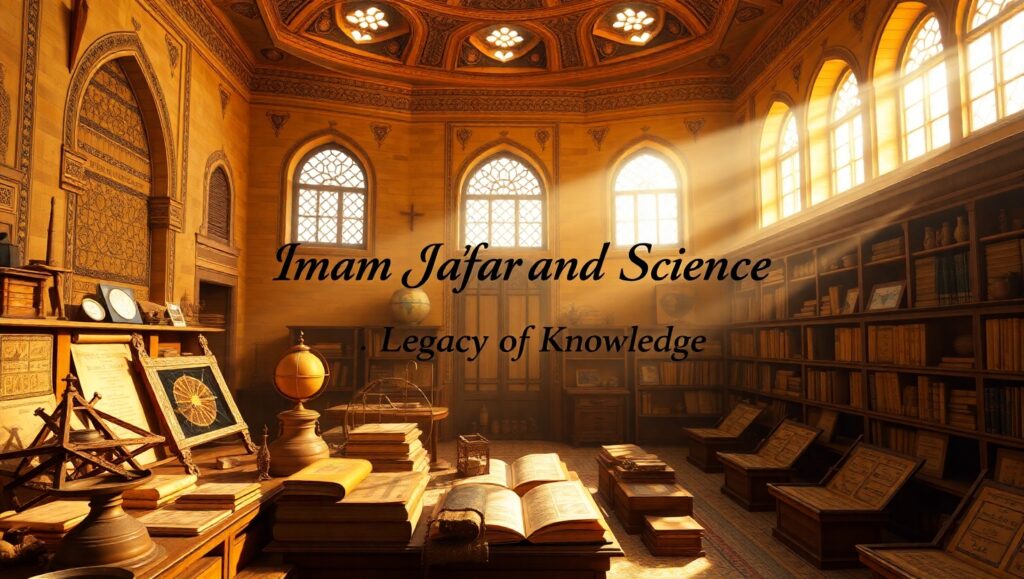Introduction
Imam Jafar al-Sadiq, the sixth Imam in the line of Shia Islam, holds a unique and respected place in Islamic history. Revered for his profound spiritual guidance, he also stood as a pioneer of scientific thought and intellectual advancement in the Muslim world. His legacy bridges the gap between faith and reason, emphasizing the divine encouragement of knowledge-seeking.
Living in an era marked by political transitions and intellectual awakenings, Imam Jafar al-Sadiq used his position not only to strengthen the spiritual lives of his followers but also to build a foundation for scientific exploration. He is credited with shaping early Islamic science and laying down the principles of the Ja’fari school of thought. This article explores the vast legacy of Imam Jafar in science, his scholarly contributions, and the enduring influence of his teachings on both religious and academic traditions.
Imam Jafar and Science: Legacy of Knowledge
The name of Imam Jafar al-Sadiq is not only synonymous with spiritual depth but also with a golden age of learning in the Islamic world. He was a polymath whose curiosity and analytical mind inspired generations. His teachings spanned fields like astronomy, medicine, chemistry, and philosophy. At a time when science and religion were often viewed separately, Imam Jafar demonstrated that both could thrive together, each enhancing the other.
Who Was Imam Jafar al-Sadiq?
Born in 702 CE in Medina, Imam Jafar al-Sadiq was a descendant of both Imam Ali (through his father, Imam Muhammad al-Baqir) and Prophet Muhammad (through his mother, Umm Farwah). This noble lineage placed him at the heart of Islamic spiritual and scholarly traditions.
Imam Jafar lived during a time of significant political change. The Umayyad dynasty was in decline, and the Abbasid revolution was on the rise. This power shift provided a window of relative openness that Imam Jafar used to develop and disseminate knowledge.
He is recognized by Shia Muslims as the sixth Imam, part of the chain of divinely appointed leaders. His long tenure as Imam (approximately 34 years) allowed him to cultivate a thriving intellectual movement in Medina. Thousands of students are said to have benefited from his teachings, among them prominent figures who later contributed to various fields of knowledge.
Imam Jafar’s Contributions to Science and Knowledge
Imam Jafar al-Sadiq’s legacy in the sciences is vast and often underappreciated in mainstream discussions. Let’s look at some of the key areas where his impact was particularly significant:
Chemistry and Alchemy
One of Imam Jafar’s most famous students was Jabir ibn Hayyan, widely known in the West as Geber. Often considered the father of modern chemistry, Jabir attributed much of his foundational knowledge to Imam Jafar. Under the Imam’s guidance, he studied substances, chemical reactions, and laboratory techniques that would form the basis of early chemistry.
Astronomy and Cosmology
Imam Jafar taught principles of celestial movement and timekeeping that were groundbreaking for his era. He emphasized observation, calculation, and alignment with natural laws. These teachings played a role in the development of Islamic astronomy, a field that would later flourish during the Islamic Golden Age.
Medicine and Hygiene
The Imam also delved into topics of medicine and public health. He advocated for preventive healthcare, natural remedies, and proper hygiene, long before modern medicine formally acknowledged their importance. His guidance included discussions on digestion, sleep, and even mental health.
Imam Jafar championed a scientific method that blended rational thought, empirical evidence, and ethical inquiry. His approach influenced not just Islamic scholars but also European thinkers through the transmission of Islamic texts.
Imam Jafar’s Legacy in Islamic Thought and Education
In addition to his scientific achievements, Imam Jafar made monumental contributions to Islamic jurisprudence and theology.
Formation of the Ja’fari School of Thought
The Ja’fari school, followed predominantly by Shia Muslims today, is based on the jurisprudential rulings and interpretations of Imam Jafar. Unlike other schools, the Ja’fari approach encourages reasoning (ijtihad) and values the context behind religious texts. This makes it flexible, analytical, and deeply rooted in ethical considerations.
Theology and Philosophy
Imam Jafar was also known for his engagement with philosophical questions. He discussed the nature of God, free will versus determinism, and the human soul. He stressed the compatibility of divine revelation with human reason—a view that attracted scholars from many disciplines.
Academic Environment
His learning circles were inclusive, featuring students from diverse sects and regions. This open environment fostered critical thinking, dialogue, and interdisciplinary research, making his institution a precursor to later Islamic universities.
Imam Jafar’s Students and Scientific Influence
Among the many students of Imam Jafar, Jabir ibn Hayyan stands out for his monumental contributions to science, especially in chemistry. But Jabir was not alone.
Other scholars trained under Imam Jafar spread his teachings throughout the Islamic empire. These disciples contributed to advancements in medicine, logic, mathematics, and religious law. Imam Jafar’s impact wasn’t limited to religious circles; it extended to the very fabric of scientific progress in the Muslim world.
His students helped document and translate his insights, forming the basis for future scientific exploration during the Islamic Golden Age. Through their work, Imam Jafar’s teachings influenced scholars in Baghdad’s House of Wisdom and even reached Europe through Latin translations centuries later.
Imam Jafar in Shia Muslim Tradition
For Shia Muslims, Imam Jafar is not only a teacher of science and jurisprudence but also a divinely inspired guide. His wisdom is seen as a reflection of divine light (nur), and his words hold both scientific and spiritual authority.
Shia communities around the world honor his legacy through education, religious gatherings, and spiritual teachings. His life is a reminder that Islam encourages both devotion and intellectual inquiry. The Ja’fari curriculum still forms the backbone of Shia religious seminaries, especially in cities like Najaf and Qom.
Moreover, Imam Jafar is frequently quoted in Shia literature on ethics, philosophy, and theology. His balanced life of worship, scholarship, and service continues to inspire scholars, students, and spiritual seekers.


